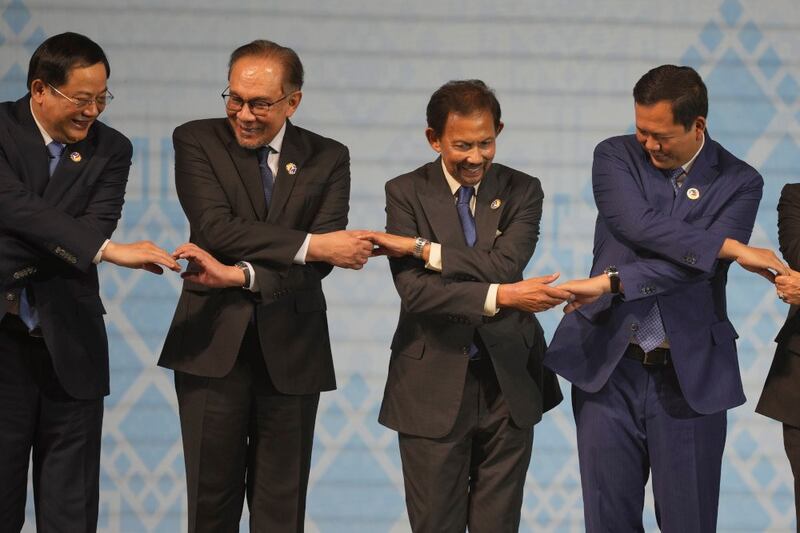Malaysian Prime Minister Anwar Ibrahim urged ASEAN members on Wednesday to beware of countries looking to exploit differences among bloc members as the geopolitical environment worsens.
Anwar, who addressed the regional bloc's annual summit, hosted by Laos, will have the task of ensuring it remains independent and united as Malaysia assumes the rotating chairmanship of the Association of Southeast Asian Nations in 2025.
“We cannot overstress the importance of dialogue and cooperation forming the fundamentals of amity and good relations,” Anwar said during a closed-door session at the 44th ASEAN Summit in Vientiane, according to speech notes shared by his office.
“As global tensions continue to rise … cracks and divisions within ASEAN run the risk of being exploited to the detriment of ASEAN centrality and cohesiveness.
“Hence, it behooves us, ASEAN member-states, to reject overtures that are predisposed to cause division,” he said.
Global think-tanks have expressed concerns that divisions among members of the Southeast Asian bloc over the war in Ukraine, the Myanmar junta and South China Sea disputes, among other issues, could undermine ASEAN’s commitment to “centrality.”
RELATED STORIES
[ ASEAN faces tests in tackling South China Sea tensions, Myanmar warOpens in new window ]
[ Philippine defense chief calls China ‘biggest disruptor’ to regional peaceOpens in new window ]
[ ASEAN chief: Bloc won’t pick sides in US-China rivalryOpens in new window ]
[ ASEAN special envoy meets with Myanmar junta leaderOpens in new window ]
Malaysia, under Anwar’s leadership, has been a critic of fellow ASEAN member Myanmar, previously calling for tougher action against its military government.
Still, finding consensus on Myanmar has proven elusive, analysts said, noting ASEAN’s founding principle of non-interference in members’ internal affairs, along with differing political alignments among its 10 member-states. In addition, the rivalry between the United States and China has placed ASEAN members in difficult positions as both superpowers seek to influence the bloc.
Cambodia, Laos and Myanmar have grown economically dependent on China, often aligning their foreign policies with Beijing, analysts said. Others including the Philippines and Singapore maintain close security ties with the U.S., leaning toward Washington on key strategic issues.
"Despite the appearance of unity, ASEAN has never truly been so," Tunku Mohar Mokhtar, an assistant professor at the International Islamic University Malaysia, told BenarNews, an RFA-affiliated online news service.
"Political elites often portray a cohesive picture, [but] internal tensions are real, particularly among nations that are more dependent on China, such as Myanmar, Laos and Cambodia."

China's Belt and Road Initiative, which has pumped billions into infrastructure projects in Southeast Asia, has expanded Beijing's footprint in the region.
Meanwhile, Washington's promotion of a " free and open Indo-Pacific" aims to counter China's growing assertiveness, particularly in the territorially contested South China Sea where Beijing's maritime claims overlap with those of ASEAN members including Vietnam, the Philippines and Malaysia.
Malaysia has maintained a policy of “hedging” relationships with both Washington and Beijing, Mohar said.
Kuala Lumpur has demonstrated its independence by criticizing Washington for its stance on the Israeli-Palestinian conflict, while continuing to pursue oil exploration in disputed South China Sea waters, despite Beijing opposing the activities.
‘Era is fading’
Associate Professor Chong Ja Ian of the National University of Singapore noted that ASEAN has grappled with these divisions for over a decade, but the stakes are rising.
The grouping’s challenge, Chong said, is that it no longer enjoys the same geopolitical flexibility it once did.
“Previously, Washington and Beijing were more willing to accommodate ASEAN’s autonomy, but that’s changing. ASEAN and its members profited from being a middleman in a globalized world, but that era is fading,” he told BenarNews.
ASEAN leaders are scheduled to meet with U.S. Secretary of State Antony Blinken and Chinese Premier Li Qiang over the next two days, which will feature plus one summits including separate events with China and the U.S., the East Asia Summit and the ASEAN-UN Summit.
The meetings in Vientiane wrap up on Friday, when Laos hands off the ASEAN chairmanship to Malaysia for 2025.
Shahriman Lockman, a senior analyst at the Institute of Strategic and International Studies Malaysia, said Kuala Lumpur’s chairmanship in 2025 would not likely see any breakthroughs on these contentious issues.
“ASEAN has always managed to muddle through despite the many global pressures,” he told BenarNews.
“I don’t expect any resolution to the Myanmar or South China Sea disputes during Malaysia’s chairmanship. Conditions are far from ripe for any form of resolution.”
BenarNews is an RFA-affiliated online news service.
